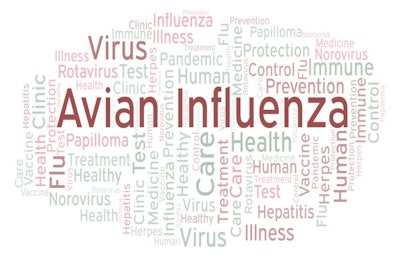
Japan’s economic ministry has raised the highly pathogenic avian influenza (HPAI) threat level to “high.”
The move follows the detection of HPAI viruses in two prefectures, reports NHK.
The presence of the H5N8 serotype of HPAI virus was confirmed at a poultry farm the city of Yokote on November 10. Located in the prefecture of Akita, this is in the northeast of the country in the Tohoku region. According to the agriculture ministry, elevated mortality had been observed in the flock of around 143,000 laying hens at the farm. The birds will be culled, and incinerated, and movement controls will apply in the area.
Later, NHK reported, an H5 variant of the virus was found on Kyushu at the other end of the country. Detected in the southwestern prefecture of Kagoshima, this virus serotype was found in the water of a rice paddy.
Following this discovery, the agriculture ministry designated zones within 10km of both infected sites for heightened surveillance and controls.
In the latest development, the agriculture ministry reports a suspicion of HPAI virus at an egg farm in the Izuma city area of Kagoshima.
Last winter, HPAI of the same serotype was first detected in Japan in early November. By the time the outbreak was over four months later, 63 outbreaks had occurred, directly affecting around 10 million poultry. This is according to official reports submitted to the World Organisation for Animal Health (OIE) over that period. Up to early March of this year, 31 wild birds had also tested positive for this virus in Japan.
Outbreak confirmed in South Korea, another suspected
Around 770,000 poultry are being culled in South Korea, according to the Yonhap news agency.
This follows confirmation of the presence of HPAI of the H5N1 serotype. Affected is a flock of quail in Eumseong county in North Chungcheong province. The farm is around 130km south of the capital, Seoul.
At a nearby flock of about 23,000 ducks, a further HPAI outbreak is suspected. Investigations are ongoing.
Like Japan, this outbreak is the country’s first of the winter. Between November of last year and April of 2021, 109 outbreaks of HPAI linked to the H5N8 virus variant were registered by South Korea with the OIE. Directly impacted through mortality or culling were more than 10.2 million poultry.
Outbreak in Israeli turkey flock
At the end of October, a flock of 35-week-old breeding turkeys in Israel tested positive for the H5N1 HPAI virus. Of the almost 5,000 birds in the Haifa region, around 500 died suddenly, according to the official OIE report. The rest of the flock has been destroyed.The source of infection is thought to be wild birds, as the farm was near a body of water used by wild species.
Around one month ago, the same virus was detected in a flock of 42,000 poultry in Hazafon (Northern district).
Backyard flock in Russian Ural district tests positive for HPAI
At the end of October, according to the official OIE notification, HPAI hit another backyard flock in the Tyumen region of Russia. Of the flock of 49 birds, 13 are reported to have died.
This brings to 14 the number of outbreaks linked to the H5N1 virus serotype in this region since June of 2021. Directly affected have been around 1,670 poultry in non-commercial flocks. Furthermore, a commercial flock of around 1.67 million birds tested positive for an HPAI of the H5 family one month ago.
Iraq reports HPAI “resolved”
At the end of October, Iraq’s veterinary authority declared to the OIE that an earlier HPAI outbreak series had been resolved.
Between January and June of this year, four large outbreaks were confirmed, affecting commercial flocks in three regions of the country. Presence of the H5N8 HPAI virus variant was detected at each location.
In total, more than 208,000 poultry died in these outbreaks, and more than 80,000 more were culled.
China records one new human infection with an avian influenza
On November 1, one new case of avian influenza A(H5N6) in China was reported by the Centre for Health Protection in Hong Kong.
Reported to be in a serious condition was a 58-year-old woman from Yongzhou in Hunan province. Before the onset of symptoms, she had been to a live bird market.
This latest patient brings to 51 the number of confirmed infections with this influenza virus type in mainland China since 2014.
View our continuing coverage of the global avian influenza situation.

















